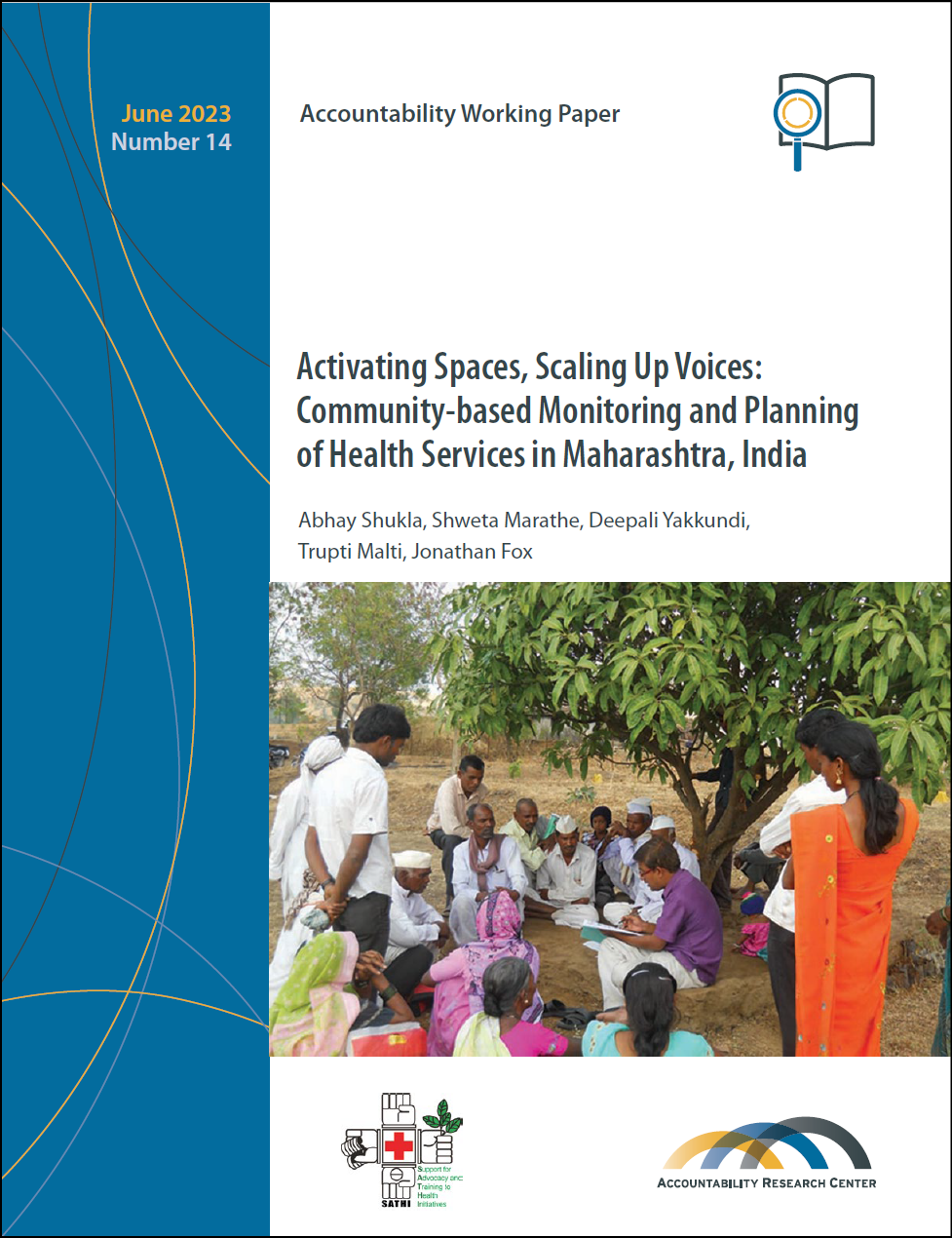
Activating Spaces, Scaling Up Voices: Community-based Monitoring and Planning of Health Services in Maharashtra, India
Date: June 2023
Author(s): Abhay Shukla, Shweta Marathe, Deepali Yakkundi, Trupti Malti, Jonathan Fox
Publication type: ARC Accountability Working Paper
Published by: Accountability Research Center
From 2007, the Indian government’s National Health Mission (NHM) supported civil society networks to carry out large-scale participatory monitoring to improve health service access and quality under the Community-based Monitoring and Planning (CBMP) program. In the state of Maharashtra, this social accountability initiative endured more than a decade and a half, despite constraints and unpredictable government funding.
The CBMP program in Maharashtra supported state-wide civil society networks to enable active citizen participation in health oversight committees. It was rooted in a broad network of diverse community-based organizations and civil society organizations that work with socially excluded communities, led by Support for Advocacy and Training to Health Initiatives (SATHI).
The CBMP network combined many social accountability tools into a multilevel strategy, using community assessments of health services and local meetings with clinic staff to inform problem-solving efforts at local, district, and state levels of the health system. This government-funded civil society initiative worked with local officials to convene public dialogues and to activate previously dormant official oversight bodies, animated by a parallel network of autonomous monitoring committees.
This Working Paper presents SATHI’s analysis of the CBMP program’s strategy and institutional dynamics, and documents its lasting effects on two participatory oversight institutions: Village Health, Sanitation, and Nutrition Committees (VHSNCs)—part of local government, and Rogi Kalyan Samitis (Patient Welfare Committees)—part of the health system. Field research, carried out shortly before the pandemic, compared the activation of these hybrid oversight bodies in areas with and without a legacy of intensive CBMP action.
Key findings include:
- Official participatory spaces for citizen engagement with the health system were much more active in districts where CBMP networks had intensively promoted grassroots capacity for voice.
- Frontline health system responsiveness to issues that could be addressed locally—identified as ‘CBMP-sensitive’—was very high. But the health system’s degree of responsiveness to problem-solving efforts decreased at higher levels.
- The period of intensive CBMP effort to build grassroots awareness and capacity was limited to six years. Nevertheless, that effort had lasting effects on the levels of activity of local hybrid health oversight bodies.
- The pandemic revealed additional evidence of the medium-term survival and institutional impact of CBMP-enabled social networks.
Abhay Shukla is a public health physician and senior consultant at SATHI Pune. He is a member of the National Health Mission Advisory Group for Community Action, of the Core Group on Health of the National Human Rights Commission, and is one of the national co-convenors of Jan Swasthya Abhiyan (People’s Health Movement). He was involved in developing the CBMP and has mentored implementation in Maharashtra since 2007. He is actively involved in campaigns for patient rights, and his writing on public health and health policy issues is widely published.
Shweta Marathe is a researcher at SATHI, Pune and has been involved in action-oriented, empirical research, specifically focusing on the functioning of the public health system and transformations in the private healthcare sector. She holds an India Health Policy and Systems Research Fellowship (2022).
Deepali Yakkundi is a research officer at SATHI, where she has worked for 15 years. As a data analyst, she has worked on public health nutrition projects and several research projects in SATHI. She handles qualitative and quantitative data, using statistical tools to analyze large datasets.
Trupti Malti has been working with SATHI for 12 years and is in charge of the Public Health and Nutrition program. She has been centrally involved in developing Maharashtra’s CBMP process. She actively contributes to health budget analysis and Maharashtra’s multisectoral social audits process.
Jonathan Fox is professor of development studies and director of the Accountability Research Center at the School of International Service at American University. He has collaborated with SATHI to learn about community-based monitoring and planning since 2016.
